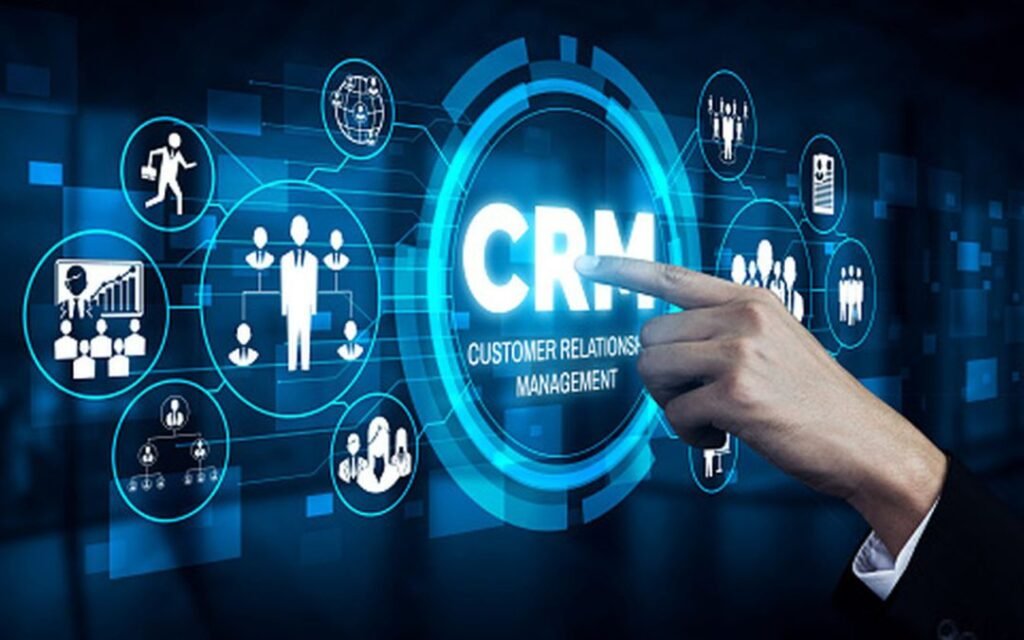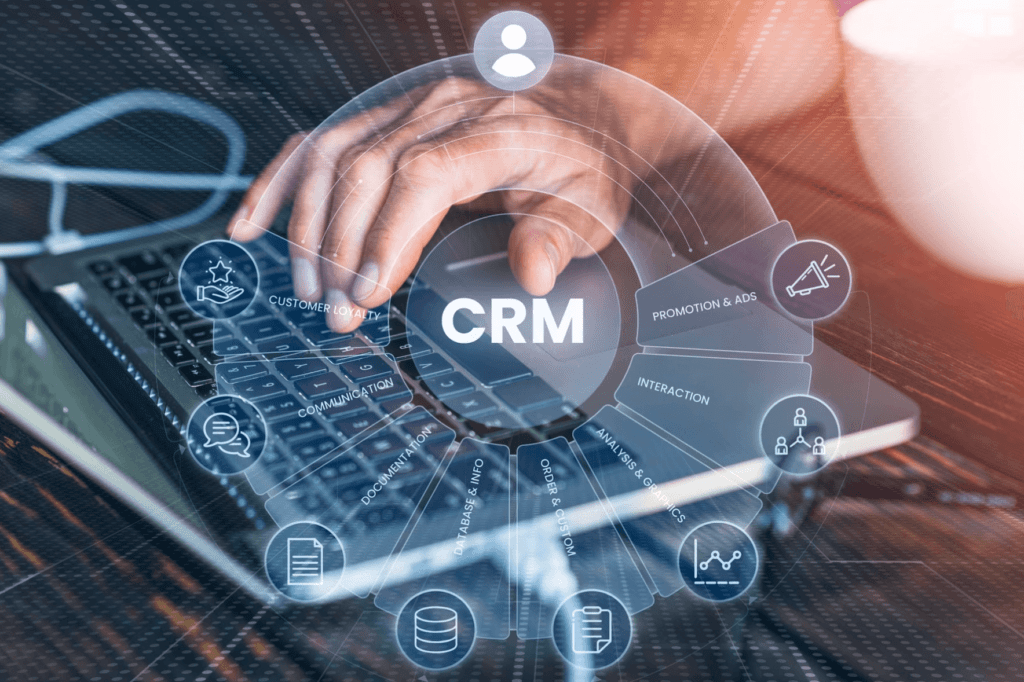In today’s rapidly changing business environment, managing customer relationships effectively is more crucial than ever. With the rise of digital technologies and evolving market demands, businesses need a CRM (Customer Relationship Management) system that is not only robust but also adaptable.

Fractional CRM has emerged as a game-changing solution, offering unparalleled flexibility and efficiency. This article explores Fractional CRM in depth, comparing it with traditional CRM systems, highlighting its unique benefits, and providing actionable insights for businesses looking to optimize their customer management strategies.
Introduction
Overview of CRM Systems
Customer Relationship Management (CRM) systems are vital tools for businesses seeking to manage interactions with their customers, streamline operations, and drive growth. At their core, CRM systems centralize customer data, track interactions, and support sales and marketing efforts.

Over the years, CRM solutions have evolved from simple databases to comprehensive platforms that integrate with various business functions, including sales automation, marketing, customer support, and analytics.
Key Benefits of Traditional CRM Systems:
- Centralized Data Management: Keeps all customer information in one place.
- Improved Customer Service: Enables timely and effective communication with customers.
- Sales Tracking: Monitors sales activities and performance.
However, traditional CRM systems often come with limitations, such as high costs, complexity, and rigidity, which can hinder their effectiveness in dynamic business environments.
Introduction to Fractional CRM
Fractional CRM is a modern approach to customer relationship management that offers a flexible and scalable alternative to traditional CRM systems. Unlike traditional CRMs, which are often monolithic and require significant upfront investment, Fractional CRM provides a modular solution that businesses can tailor to their specific needs.
What Sets Fractional CRM Apart:
- Modularity: Allows businesses to select and pay for only the features they need.
- Scalability: Adapts to changing business requirements and growth.
- Cost-Effectiveness: Reduces the need for large upfront investments.
The Evolution of CRM Systems
Traditional CRM Systems
Traditional CRM systems have been a cornerstone of customer management for decades. They offer a range of functionalities, including contact management, sales forecasting, and customer support. However, these systems often come with several challenges:
Challenges of Traditional CRM Systems:
- High Cost: Significant initial investment and ongoing maintenance expenses.
- Complex Implementation: Time-consuming setup and integration with existing systems.
- Limited Customization: Rigid structures that may not align with unique business processes.
Despite these challenges, traditional CRM systems have provided valuable insights and improvements in customer management, paving the way for the development of more flexible solutions like Fractional CRM.
Rise of Fractional CRM

Fractional CRM systems have gained prominence as businesses seek more adaptable and cost-effective solutions. These systems address the limitations of traditional CRM by offering a modular approach that allows businesses to start with essential features and expand as needed.
Why Fractional CRM is Gaining Popularity:
- Flexibility: Tailors to specific business needs and workflows.
- Cost Savings: Reduces the financial burden of extensive CRM systems.
- Adaptability: Easily scales with business growth and changing requirements.
Understanding Fractional CRM
Definition and Key Characteristics
Fractional CRM is designed to provide businesses with a flexible, modular CRM solution that can be customized to fit their unique needs. Key characteristics include:
Core Features of Fractional CRM:
- Modular Design: Separate modules for sales, marketing, customer support, and more.
- Scalability: Ability to add or remove features based on business needs.
- Integration Capabilities: Seamless integration with other business tools and systems.
Modular Design Explained:
- Core Modules: Basic features such as contact management and sales tracking.
- Advanced Modules: Optional features like marketing automation and analytics.
- Integration Modules: Connects with ERP systems, email marketing tools, and other platforms.
Benefits of Fractional CRM
- Flexibility and Scalability
- Fractional CRM systems can be easily customized to fit a variety of business needs. Whether a company requires basic contact management or advanced analytics, Fractional CRM offers a solution that grows with the business.
- Cost-Effectiveness
- By allowing businesses to select and pay for only the features they need, Fractional CRM reduces the financial burden associated with traditional CRM systems. This pay-as-you-go model helps manage costs more effectively.
- Customization Options
- Fractional CRM systems provide extensive customization options, allowing businesses to tailor the system to their specific processes and workflows. This level of personalization ensures a better fit for the company’s unique needs.
Comparison: Fractional CRM vs. Traditional CRM
To highlight the advantages of Fractional CRM, let’s compare it with traditional CRM systems in more detail:
| Feature | Fractional CRM | Traditional CRM |
|---|---|---|
| Flexibility | Highly adaptable to changing needs, with modular components that can be added or removed. | Often rigid and less customizable, with predefined features and functions. |
| Cost | Typically more affordable with a pay-as-you-go model that reduces upfront investment. | Can be expensive with high upfront costs and ongoing maintenance fees. |
| Scalability | Easily scalable, allowing businesses to expand or modify their CRM solution as needed. | May require significant investment to scale or customize, with potential disruptions. |
| Customization | Tailored to specific requirements, with extensive options for modifying features and workflows. | Limited customization options, often resulting in a one-size-fits-all approach. |
| Implementation Time | Faster setup and deployment due to modular design and pre-configured components. | Longer implementation time due to complex setup and integration processes. |
| Support and Maintenance | Often included or available on-demand, reducing the need for separate support contracts. | Separate support contracts may be required, adding to overall costs. |
Key Features of Fractional CRM
Modular Design
Fractional CRM systems are built with separate modules that can be customized based on business needs. This modular design allows businesses to select the functionalities they require and add more as their needs evolve.
Benefits of Modular Design:
- Tailored Solutions: Businesses can choose modules that align with their specific processes.
- Cost Control: Pay only for the features needed, reducing unnecessary expenses.
- Ease of Expansion: Add new modules as the business grows or as new needs arise.
Integration Capabilities
Fractional CRM systems are designed to integrate seamlessly with other business tools and systems. This integration ensures a unified view of customer interactions and enables businesses to streamline their processes.
Examples of Integration:
- ERP Systems: Integration with ERP systems provides real-time insights into inventory, sales, and financial data.
- Marketing Tools: Connects with email marketing platforms, social media management tools, and campaign analytics.
- E-commerce Solutions: Syncs with online store platforms to track customer purchases and interactions.
User-Friendly Interface

A user-friendly interface is crucial for ensuring that employees can effectively use the CRM system. Fractional CRM solutions prioritize intuitive design, reducing the learning curve and improving user adoption.
Advantages of a User-Friendly Interface:
- Increased Adoption: Employees are more likely to use the system effectively if it is easy to navigate.
- Reduced Training Time: Intuitive design minimizes the need for extensive training.
- Enhanced Productivity: Streamlined workflows and easy access to information improve overall efficiency.
Pros and Cons of Fractional CRM
| Aspect | Pros | Cons |
|---|---|---|
| Flexibility | Highly flexible with modular design; businesses can choose and pay for only the features they need. | Can be complex to integrate multiple modules or third-party systems. |
| Cost-Effectiveness | Cost-effective with a pay-as-you-go model; reduces financial burden of traditional CRM systems. | Ongoing costs may accumulate as more modules or features are added. |
| Scalability | Easily scalable; businesses can start with essential modules and expand as needed. | Scaling may require additional investment in new modules or features. |
| Seamless Integration | Integrates seamlessly with other business tools and systems for a unified view of customer data. | Integration complexity may require additional configuration or technical expertise. |
| User-Friendly Interface | Features intuitive interfaces that enhance user adoption and reduce the learning curve. | Initial learning curve may still be present for employees adapting to the new system. |
| Advanced Analytics and Reporting | Provides robust analytics and customizable reporting for actionable insights. | Customization limitations may exist based on available modules and features. |
| Dependence on Module Providers | N/A | Dependence on third-party providers for additional functionalities; potential support issues. |
| Customization Options | Extensive customization options to tailor the system to specific business needs. | May encounter limitations if needs exceed module capabilities. |
This detailed table provides a comprehensive overview of the pros and cons of Fractional CRM, helping businesses weigh the advantages and challenges when considering this flexible CRM solution.
Advantages of Fractional CRM
Cost-Effectiveness
Fractional CRM systems offer significant cost advantages over traditional CRM solutions. The modular approach allows businesses to manage their expenses more effectively by only paying for the features they use.
Cost Benefits:
- Reduced Upfront Investment: Lower initial costs compared to traditional CRM systems.
- Pay-as-You-Go Model: Flexible pricing that aligns with business growth and changing needs.
- Ongoing Savings: Lower maintenance and support costs due to the modular nature of the system.
Scalability and Flexibility
Fractional CRM’s modular design allows businesses to scale their CRM solution as their needs change. This adaptability ensures that the CRM system continues to meet the company’s requirements as it grows.
Scalability Benefits:
- Easily Adjustable: Add or remove modules based on evolving business needs.
- Future-Proofing: Adapt to new trends and technologies without overhauling the entire system.
- Growth Management: Support business expansion with scalable CRM features and functionalities.
Customization and Personalization
Fractional CRM systems offer extensive customization options, allowing businesses to tailor the system to their specific processes and workflows. This level of personalization enhances the effectiveness of the CRM solution.
Customization Benefits:
- Aligned with Business Processes: Tailor the CRM system to fit unique workflows and requirements.
- Enhanced User Experience: Customize interfaces and features to improve usability and efficiency.
- Better Data Management: Design CRM solutions that align with data management and reporting needs.
Watch: How Fractional CRM Solutions Revolutionize Customer Management
This video delves into the benefits of adopting a Fractional CRM approach for your business. Learn how this flexible solution can enhance your customer management processes, offering the expertise of a full-time CRM system without the heavy investment. Discover why more businesses are turning to Fractional CRM for effective and scalable customer relationship management.
Implementing Fractional CRM
Steps to Implement Fractional CRM
- Assess Business Needs: Start by evaluating your business requirements and identifying the key functionalities you need from a CRM system. Consider factors such as sales processes, customer support needs, and integration requirements.
- Choose a Fractional CRM Provider: Research and select a Fractional CRM provider that offers the modules and integration capabilities you need. Evaluate providers based on their reputation, customer support, and scalability options.
- Customize the CRM System: Work with the provider to customize the CRM system to fit your specific processes and workflows. Configure modules, set up integrations, and tailor the user interface to meet your needs.
- Train Users: Provide training for employees to ensure they can effectively use the new CRM system. Offer hands-on training sessions, create user guides, and provide ongoing support to help employees adapt.
- Monitor and Optimize: Continuously monitor the performance of the CRM system and make adjustments as needed. Gather feedback from users, analyze system usage, and optimize features to enhance efficiency.
Challenges and Solutions
While Fractional CRM offers numerous benefits, businesses may encounter challenges during implementation. Common challenges include data migration, user adoption, and integration with existing systems. Here are some solutions to address these challenges:
Data Migration:
- Solution: Work with your CRM provider to ensure a smooth transition of data from existing systems. Use data migration tools and services to minimize disruptions and ensure data accuracy.
User Adoption:
- Solution: Provide comprehensive training and support to help employees adapt to the new CRM system. Foster a positive attitude towards the change by highlighting the benefits and providing ongoing assistance.
Integration:
- Solution: Ensure that the Fractional CRM system integrates seamlessly with other business tools to avoid disruptions. Collaborate with the provider to address any integration issues and ensure a unified view of customer data.
Case Studies and Success Stories
Business Case Study 1: HubSpot’s Adaptation for Growing Startups
Background: HubSpot, a leading CRM provider, recognized the need for a more flexible solution for startups and growing businesses. Their traditional CRM offering was robust but not always cost-effective or scalable for smaller businesses.
Implementation: HubSpot introduced a Fractional CRM model that allowed startups to choose from a range of modular features such as contact management, sales automation, and marketing tools. This model enabled businesses to start with basic functionalities and add more as they grew.
Results: Startups using HubSpot’s Fractional CRM model saw a significant reduction in CRM costs and a 50% increase in efficiency in managing customer interactions. The modular approach allowed these businesses to scale their CRM capabilities in line with their growth.
Key Takeaways: The Fractional CRM model provided a scalable and cost-effective solution for startups, allowing them to manage customer relationships effectively without significant upfront investment.
Business Case Study 2: Salesforce’s Modular Solutions for Enterprises
Background: Salesforce, a prominent CRM provider, faced challenges with delivering a one-size-fits-all solution to its large enterprise clients. Enterprises often required tailored solutions that could adapt to their complex and evolving needs.
Implementation: Salesforce introduced a modular CRM approach that allowed enterprises to select from a variety of modules, including sales, marketing, customer support, and analytics. This approach provided flexibility and customization to meet the unique requirements of large organizations.
Results: Enterprises using Salesforce’s modular CRM saw a 35% improvement in operational efficiency and a 40% increase in customer satisfaction. The ability to customize and scale the CRM system helped these organizations streamline their processes and enhance customer engagement.
Key Takeaways: Salesforce’s modular approach offered enterprises a flexible and scalable CRM solution, enabling them to address specific business needs and drive improved performance.
Conclusion
Recap of Key Points
Fractional CRM represents a flexible and cost-effective solution for businesses seeking to optimize their customer management. With its modular design, scalability, and extensive customization options, Fractional CRM addresses the limitations of traditional CRM systems and offers a tailored approach to managing customer relationships.
Key Benefits of Fractional CRM:
- Flexibility: Adaptable to changing business needs with modular components.
- Cost-Effectiveness: Reduces financial burden with a pay-as-you-go model.
- Customization: Tailored solutions that align with specific business processes.
Future of Fractional CRM
As businesses continue to evolve and grow, Fractional CRM will play a crucial role in providing adaptable and scalable solutions. Future developments may include advanced AI-driven features, enhanced integration capabilities, and further customization options to meet the diverse needs of businesses.
Emerging Trends:
- AI Integration: Incorporating artificial intelligence for predictive analytics and automation.
- Enhanced Integration: Expanding integration capabilities with emerging technologies.
- Increased Personalization: Offering more tailored solutions based on individual business needs.
Call to Action
If you’re looking for a CRM solution that offers flexibility, cost-effectiveness, and customization, consider exploring Fractional CRM. Evaluate your business needs, choose a provider that aligns with your requirements, and start optimizing your customer management processes today. Fractional CRM can help you manage customer relationships more effectively, drive growth, and stay ahead in a competitive market.
Additional Resources
- Further Reading: Explore more articles, whitepapers, and studies on Fractional CRM to deepen your understanding and stay informed about the latest trends and best practices.
- Glossary of Terms: Familiarize yourself with key terms and concepts related to Fractional CRM to enhance your knowledge and facilitate better decision-making.
More articles you must like
- Why Every Business Needs a Fractional CMO: Insights and Advantages
- 5 steps to transform your CRM into a revenue generating machine
- Mastering CRM Best Practices in 2024
FAQ’s
What is Fractional CRM?
Fractional CRM is a modular customer relationship management system that allows businesses to choose and pay for specific features or modules based on their needs. Unlike traditional CRM systems, which offer a fixed set of functionalities, Fractional CRM provides flexibility and scalability by enabling businesses to start with essential modules and add more as needed.
How does Fractional CRM differ from traditional CRM systems?
Fractional CRM differs from traditional CRM systems in its modular design and cost structure. Fractional CRM offers flexibility by allowing businesses to select individual modules (e.g., sales, marketing, customer support) and pay only for what they use. Traditional CRM systems often involve high upfront costs and a fixed set of features, which may not be as adaptable to changing business needs.
What are the key benefits of using Fractional CRM?
Key benefits of Fractional CRM include:
Advanced Analytics: Provides robust reporting and analytics capabilities.
Flexibility: Businesses can choose and customize modules based on their specific needs.
Cost-Effectiveness: The pay-as-you-go model reduces financial burden.
Scalability: Easy to scale with the addition of new modules as the business grows.
Seamless Integration: Integrates well with other business tools and systems.
User-Friendly Interface: Intuitive design enhances user adoption.
What types of businesses can benefit from Fractional CRM?
Fractional CRM is suitable for businesses of all sizes, from startups to large enterprises. Small businesses benefit from the cost-effective and scalable nature of Fractional CRM, while larger organizations appreciate the flexibility and customization options. It is particularly advantageous for companies with dynamic needs or those looking to avoid high upfront costs.
How does Fractional CRM support scalability?
Fractional CRM supports scalability through its modular design. Businesses can start with core modules and add more as their needs evolve. This allows companies to grow and expand their CRM capabilities without having to overhaul the entire system. As businesses scale, they can integrate additional modules for new functionalities or advanced features.
What are the potential challenges of implementing Fractional CRM?
Fractional CRM systems typically include data migration tools and support to facilitate the transition from existing systems. These tools help ensure that data is accurately transferred and integrated into the new CRM system. Working with the CRM provider and using migration services can help minimize disruptions and ensure a smooth data migration process.
Can Fractional CRM systems integrate with existing business tools?
Yes, Fractional CRM systems are designed to integrate seamlessly with a variety of business tools, including ERP systems, marketing automation platforms, and e-commerce solutions. Integration ensures a unified view of customer interactions and streamlines business processes. However, the complexity of integration may vary depending on the tools and systems in use.
What support options are available for Fractional CRM users?
Fractional CRM providers typically offer various support options, including:
Customer Service: Ongoing support for queries and system maintenance, often included in the subscription package.
Technical Support: Assistance with system issues, configuration, and troubleshooting.
Training: User training sessions, tutorials, and documentation to help employees effectively use the system.
How does Fractional CRM compare in terms of analytics and reporting?
Fractional CRM systems generally offer advanced analytics and reporting capabilities compared to traditional CRM systems. They provide customizable dashboards, detailed reports, and actionable insights that can be tailored to specific business needs. This enables businesses to track key performance indicators (KPIs) and make data-driven decisions more effectively.
